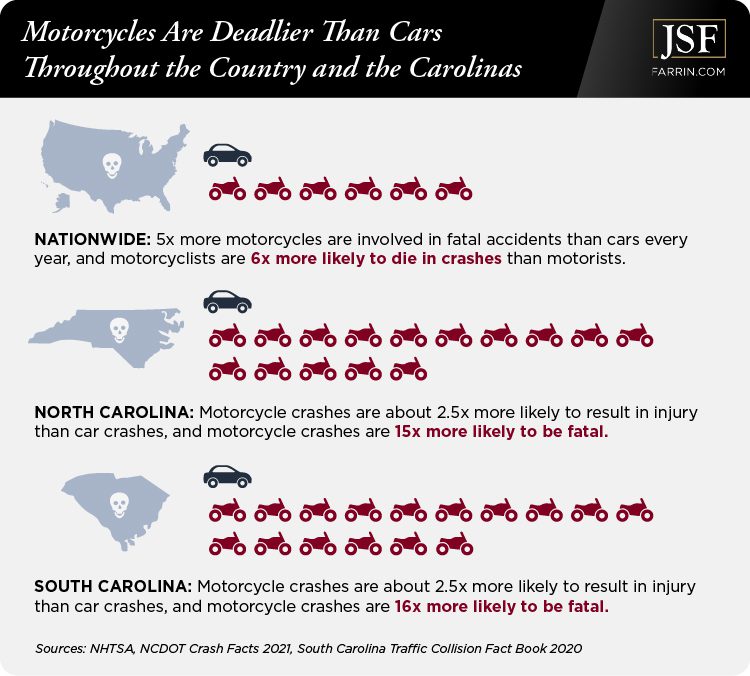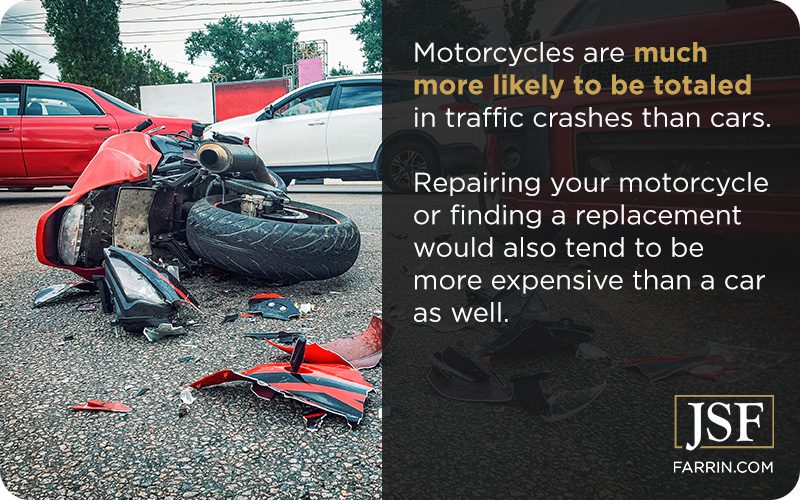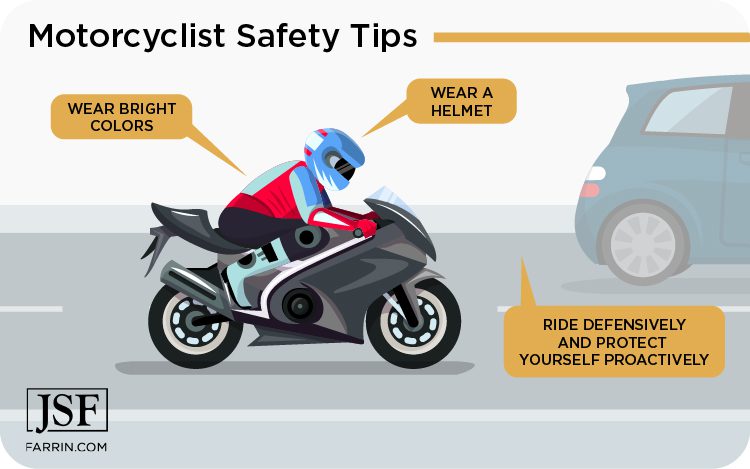Motorcycle and car accidents share many similarities, but also many key differences that affect how deadly they can be, the types of injuries you may suffer, and the causes for them. And if you’re seeking compensation after an accident caused by another, the differences in motorcycle accidents vs. car accidents can also impact your strategy and your odds for success.
Motorcycle Accidents Are Deadlier and More Dangerous than Car Accidents
It should come as no surprise to anyone that motorcycle accidents are far more dangerous than car accidents, both nationwide and within the Carolinas. Motorcycle accident injuries also tend to be worse than car accident injuries.
Exactly how much worse are they? Here are the numbers:
Motorcycle Accident and Car Accident Statistics
Nationwide
According to the Insurance Information Institute, passenger vehicles account for 92% of all registered vehicles, yet motorcyclists are 6x more likely to die in crashes than passengers in cars in general, and 27x more likely to die per miles traveled.
According to the National Highway Traffic Safety Administration (NHTSA), 13 out of 100,000 cars are involved in a fatal accident each year. For motorcycles, it’s 72 out of 100,000 – that’s greater than 5x more deaths.
North Carolina
According to the North Carolina Department of Transportation (NCDOT):
-
- There were 3,712 motorcycle crashes in 2021, of which 2,847 involved injuries and 210 were fatal, while in the same year, there were 249,927 car crashes, of which 71,758 involved injuries and 1,040 involved deaths.
-
- Motorcycle crashes were 77% likely to result in injury compared to a 29% likelihood for car crashes; motorcycle crashes were 6% likely to be fatal compared to a .04% likelihood for car crashes.
-
- Motorcycle riders aged 20-29 have the highest number of injuries and fatalities. Out of 3,174 motorcyclists killed or injured in 2021, 784 (25%) were in the 20-29 age range. Note that this is the same general age range at which the majority of alcohol-related fatal crashes occur in the state.
South Carolina
According to the South Carolina Department of Transportation (SCDOT):
-
- There were 2,215 motorcycle crashes in 2021, of which 1,593 involved injuries and 173 were fatal, while also in 2021, there were 128,901 car crashes, of which 32,907 involved injuries and 645 were fatal.
-
- Motorcycle crashes were 72% likely to result in injury compared to a 26% likelihood for car crashes; motorcycle crashes were 8% likely to be fatal compared to a .05% likelihood for car crashes.
-
- There was a 43.1% increase in the number of fatal motorcycle crashes in South Carolina from 2020-2021 compared to a 10.8% increase in fatal automobile crashes.
Types of Severe or Fatal Injuries Faced by Motorcyclists Vs. Drivers of Passenger Cars
Though both motorcycle accidents and car accidents can cause serious injury and death, the types of injuries and causes of fatalities differ. In addition, data from NHTSA, the NCDOT, and the SCDOT shows that motorcyclists are more likely to face serious injury than car occupants.
Some of the serious injuries faced more often by motorcyclists than car occupants include:
- Spine and spinal cord injury
- Traumatic brain injury
- Road rash from the motorcyclist’s body rapidly skidding across the pavement
- Internal organ damage
- Loss of limbs
- Facial disfigurement, especially involving the chin
- Broken bones, especially the shoulders, back, and pelvis
- Biker’s Arm – a condition that can cause permanent nerve damage resulting in pain and paralysis throughout the hands and arms
Note: Motorcycles are also much more likely to be totaled in traffic crashes than cars. If you depend on your motorcycle for transportation, or even if you just ride for fun, losing it can have a significant negative impact on you. Repairing your motorcycle or finding a replacement also tends to be more challenging than repairing or replacing a car.
If you’ve been injured in a motorcycle or car accident, contact us now for a free case evaluation at 866-900-7078. We can help you fight for all the compensation you may deserve.
Causes of Motorcycle Accidents Vs. Car Accidents
Distracted driving and driver error are the main causes of car accidents and are at the root of many motorcycle accidents as well.
One important difference for the causes of motorcycle accidents vs. car accidents is that motorcycles are much smaller and often get overlooked on the roadway. Drivers often don’t notice them until it’s too late to avoid a collision.
There are several ways traffic crashes can occur that are much more likely to happen with motorcycles than cars or much more likely to seriously injure a motorcyclist than a driver, such as:
-
- Left-hand turns – It may be surprising to discover that cars making left-hand turns in front of an oncoming motorcyclist cause 41% of motorcycle accidents, according to NHTSA.
-
- Fixed objects – Collisions with fixed objects such as trees, light posts, and fences are more likely to result in serious injuries for motorcyclists and account for 25% of fatal motorcycle accidents, compared to 18% of fatal car accidents.
-
- Debris – An object a car can ride over may represent a serious threat to a motorcycle. For example, bikers must constantly post warnings to others about grass clippings that a property owner blew into the road while mowing. Grass in a curve can be nearly as dangerous as ice.
-
- Speeding – A speeding motorcycle is more difficult to control and maneuver than a car, and a motorcycle is more likely than a car to tilt, roll over, and skid because of excessive speed. Meanwhile, speeding car drivers are even less likely than usual to notice and react safely to motorcyclists than those going at the posted speed limit.
-
- Lane splitting – This motorcyclist practice can be very dangerous. Driving your motorcycle between rows of slow-moving or stopped cars or filtering forward between cars at stoplights is illegal in both North Carolina and South Carolina.
Alcohol Causes More Motorcycle Accidents Than Car Accidents
The link between alcohol use and fatal motorcycle accidents can’t be ignored. NHTSA found that motorcyclists killed in crashes had higher amounts of alcohol impairment than operators of any other type of motor vehicle.
Drunk driving is never acceptable for any reason, and it will likely end very badly for you and others if you get wasted and go for a ride. Just don’t do it.
Protecting Against Motorcycle Accidents Vs. Car Accidents
While even the most economical cars on the road today often have a host of safety features to protect drivers and passengers, the same obviously cannot be said for motorcycles. This means motorcyclists must be particularly careful about avoiding accidents and protecting their bodies.
Some of the best safety tips for motorcyclists include:
- Wear a helmet – NHTSA estimates that nearly 1,800 motorcyclists’ lives would be saved by helmets every year.In states without universal helmet laws, 57% of motorcyclists in fatal crashes weren’t wearing helmets, compared to 8% in states where helmets are mandatory for everyone. Helmets are required for all motorcyclists in North Carolina and for riders under 21 in South Carolina, but you should wear a helmet regardless of your age.
You should also consider the importance of other safety gear such as protective jackets, pants, gloves, and boots. Many bikers use the lingo ATGATT, which stands for, “All The Gear, All The Time,” meaning they use all available safety gear when they ride.
Meanwhile, some bikers wear only shorts or t-shirts when they ride, which offer no protection at all. While that’s their right, they should understand the additional risks this poses. Footwear is also a big issue. Low tennis shoes or similar footwear won’t protect you nearly as well as quality boots.
-
- Wear bright colors – Negligent drivers often don’t see motorcyclists until it’s too late. Make yourself more noticeable on the road by wearing bright colors and turning on your motorcycle headlight, even for daytime rides.
-
- Ride defensively and protect yourself proactively – This tip is for both motorcyclists and car drivers, but is even more critical for riders. The heightened danger of riding a motorcycle means you need to take greater care than drivers to protect yourself and avoid crashes, if for no other reason than because the consequences could be so much more disastrous for you!
This means avoiding dangerous road conditions and never driving recklessly, negligently, or under the influence. And basic maintenance, such as keeping your tires properly inflated, should never be ignored.
Seeking Compensation for Motorcycle Accidents Vs. Car Accidents
If you’ve been injured by a negligent driver in a traffic crash through no fault of your own, you deserve compensation regardless of the type of vehicle you were operating. Both drivers and riders should file an insurance claim if they were injured by another in a wreck.
One difference in seeking compensation for motorcycle accidents vs. car accidents is that many motorcyclists face biases when filing claims that passenger car drivers do not. The image of the rebellious biker is one that persists in the minds of many all over the country, and so it can be harder to receive the full compensation you may deserve for your motorcycle injury claim.
Some unique biases and key differences that may impact a rider’s fight for maximum compensation from a motorcycle accident include:
-
- Insurance adjusters might try to reduce or refuse your compensation, perhaps more aggressively than if you were driving a car.
-
- Judges and juries might be more likely to determine that a motorcyclist was at fault, or undeserving of as much compensation from the at fault party’s insurer.
-
- Because motorcycle accidents are more likely to result in serious injuries, you’re likely to have more medical bills as a result. This makes it all the more important to document everything and establish a paper trail that supports your injury claim and doesn’t give the insurance company an opportunity to reduce or deny your possible compensation.
-
- Because motorcycle wrecks are more likely to result in the death of the rider, wrongful death claims for motorcycle accidents are tragically and unfortunately far more common than for car wrecks.
Check out this infographic on the dangers and differences between Motorcycle Accidents vs Car Accidents in North Carolina.
Why You Want A Motorcycle Accident Attorney On Your Case
There are many differences when it comes to motorcycle accidents vs. car accidents that can make a huge impact on how much you ultimately may receive for your claim. Additionally, the tiniest detail can make or break your case. That’s why you want to hire a motorcycle accident lawyer after your wreck.
Simply put, an experienced attorney can significantly improve your odds of success.
Your motorcycle accident lawyer can help you with:
-
- Handling your complex claim – your motorcycle accident attorney or car accident attorney knows how to manage the deadlines and the details while collecting evidence, examining your medical records, and interviewing any witnesses to help build your case.
-
- Taking on the insurance company – while the insurance company is protecting its own interests, your attorney protects yours. If an insurance adjuster says that you were responsible for the car crash or tries to leverage false stereotypes about motorcyclists, your attorney knows how to fight back for you.
-
- Seeking full compensation – whether you were injured by another while driving your car or riding your motorcycle, you deserve compensation from the person at fault. Your attorney can investigate all possible avenues of compensation for you, including any hidden insurance policies.
Call to Get Clarity on Your Case With No Fee or Obligation
Our auto accident lawyers know how to help you. Several of our attorneys once worked for insurance companies, meaning we know how they operate and can strategize for your claim using our other-side knowledge.
We’ve recovered more than $1.6 billion in total compensation for over 60,000 people since 1997. And counting.1
Callout: One of our motorcycle accident clients, Alex, was riding home from his shift as a police officer when he was hit by a car. He turned to us, and he was glad he did.1
And If you’re concerned about cost, you should know that James Scott Farrin operates on a contingency fee basis, meaning you don’t pay an attorney’s fee unless we recover compensation for you.2
Tell them you mean business! If you’ve been injured in a car or motorcycle accident, contact us for a free case evaluation today at 1-866-900-7078.







